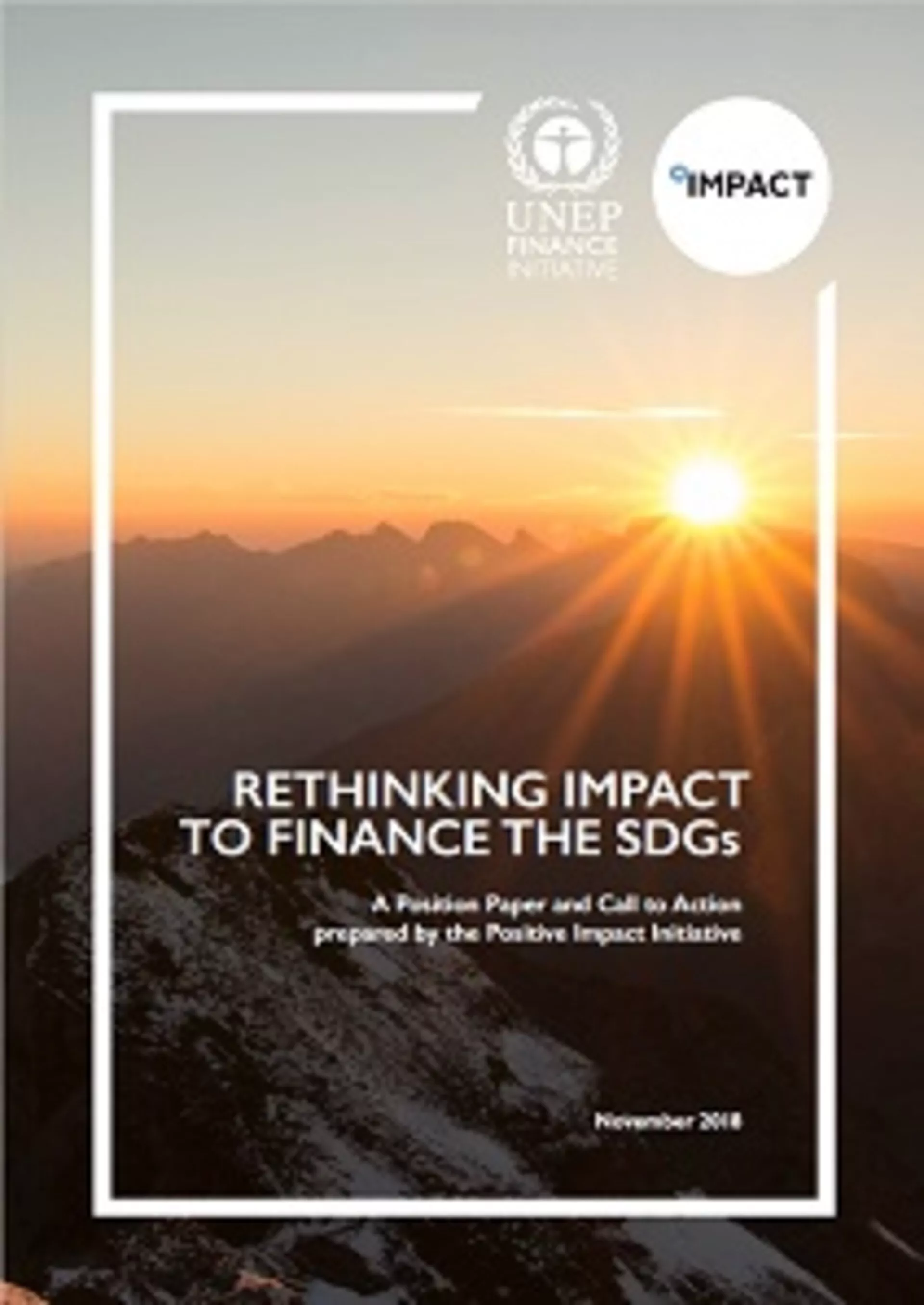
How to achieve the Sustainable Development Goals?
Rethinking Impact to Finance the SDGs: visionary solutions to the sustainable development goals’ funding gap from Societe Generale and UNEP FI’s positive impact initiative
 Rethinking Impact to Finance the SDGs is a product of UNEP FI’s Positive Impact Initiative, co-authored by Société Générale and UNEP FI. The paper reviews the scope and nature of the financing gap for sustainable development and the Sustainable Development Goals (SDGs) in order to propose new solutions for finance, business and a broader set of stakeholders. It builds on the Initiative’s earlier Manifesto (2015) and Principles for Positive Impact Finance (2017), clarifying the concepts of impact-based business models, impact-based economy and holistic impact analysis. Rethinking Impact is both a position and a discussion paper. With the ideas put forward in these pages we hope to stimulate further debate and research on impacts and the opportunities that impact data, analysis and business models open up to address the pressing challenges of our times.
Rethinking Impact to Finance the SDGs is a product of UNEP FI’s Positive Impact Initiative, co-authored by Société Générale and UNEP FI. The paper reviews the scope and nature of the financing gap for sustainable development and the Sustainable Development Goals (SDGs) in order to propose new solutions for finance, business and a broader set of stakeholders. It builds on the Initiative’s earlier Manifesto (2015) and Principles for Positive Impact Finance (2017), clarifying the concepts of impact-based business models, impact-based economy and holistic impact analysis. Rethinking Impact is both a position and a discussion paper. With the ideas put forward in these pages we hope to stimulate further debate and research on impacts and the opportunities that impact data, analysis and business models open up to address the pressing challenges of our times.
The paper was co-authored by Société Générale and UNEP FI. Main contributors:
Société Générale
◼ Denis Childs, Co-Chair of the PI Initiative & Head of Positive Impact Finance and Environmental and Social Advisory
◼ Sonia Essobmadje, Impact-Based Finance
UNEP FI
◼ Careen Abb, Programme Lead, Positive Impact Finance
◼ Jérôme Tagger, Outreach & Communications, Positive Impact Finance
With the support of the entire Impact-Based Finance team at Société Générale and the Positive Impact Finance team at UNEP FI.
- Download the report
- Access the UNEP FI website
RETHINKING IMPACT TO FINANCE THE SDGs
In Rethinking Impact to Finance the SDGs, we explore new ways to significantly decrease the cost of achieving the SDGs and stimulate business and financing solutions at scale.
- Social, economic and environmental impacts have an as-yet under explored potential to generate financial revenues: impact-based business models can be developed, with the delivery of positive impacts as a driver of sustainable business growth and long term enterprise value.
- This could be game-changing: by making it cheaper to deliver sustainability outcomes, less risky to finance and would stimulate the private sector to create new business solutions that focus on positive impacts. In fact, this shift to an impact-based economy is already under way, and the finance sector has a strategic interest in understanding impacts, not only to meet stakeholder needs, but also to capture new opportunities that support this transformation. Accordingly, it is critical for banks and investors to improve their capacity to understand and analyze impact.
Rethinking Impact is not just for financial institutions, but also for businesses, national and local public authorities, academia, civil society and everyday people. Only by working collaboratively across all stakeholder will the Global Goals be achieved.
Two years after the Positive Impact Manifesto and the Positive Impact Initiative at UNEP FI, Rethinking Impact articulates the concepts of an impact-based economy. It is the result of extensive research by the PI team supported by active external consultation. It explains the work we are undertaking to promote a common impact language, and extends an open invitation to design the way forward together.
An initial draft was made available for consultation during the summer of 2018 and the final version was released at the UNEP FI Global Roundtable in Paris, 26-28 November 2018.




